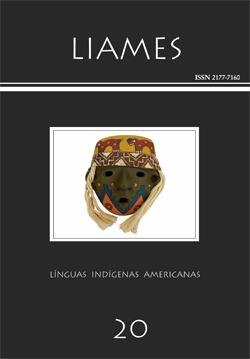Abstract
In a recent publication, “El contacto warao-español. Consideraciones sobre el proceso de aculturación léxica de la lengua nativa del delta del Orinoco”, Andrés Romero-Figueroa presents a study in the sociolinguistic scope of the processes of linguistic contact and lexical acculturation between Warao and Spanish. Warao is a language spoken by a native population that occupies a vast extension of the delta region of the Orinoco River, northeast of the Bolivarian Republic of Venezuela and north of western Guyana, while Spanish is the official language of the Venezuelan nation. The author's study shows the asymmetrical impact of lexical changes exerted in the respective indigenous language, and the main linguistic strategies implemented by Warao speakers in adapting concepts alien to indigenous culture, introduced since the period of Spanish arrival to this part of the American continent.
References
Brown, Cecil H. (1999). Lexical acculturation in Native American languages. New York-Oxford: Oxford University Press.
Heinen, Dieeter; Gassón, Rafael; García-Castro, Álvaro (2012). Desarrollo institución Warao: Identidad étnica y diversidad histórica. Cuestiones clave en la etnografía y la ecología histórica del delta del Orinoco y el territorio Warao-Lokono-Paragoto. Revista Lider 21: 113-142. http://ceder.ulagos.cl/lider/images/numeros/21/5.-LIDER%2021_Heinen_pp113_142.pdf
Instituto Nacional de Estadística INE (2014). xiv Censo nacional de población y vivienda. Venezuela: Instituto Nacional de Estadística. http://www.ine.gov.ve/documentos/Demografia/CensodePoblacionyVivienda/pdf/nacional.pdf
Monsony, Esteban Emilio (2012). El discurso sobre la irreversible extinción de las lenguas: Un atentado contra la interculturalidad. Boletín de Lingüística 24(37/38): 127-215. http://ve.scielo.org/pdf/bl/v24n37-38/art09.pdf
Romero-Figueroa, Andrés (2000). Basic word order and sentence type in Kari’ña (Languages of the World Series 18). Munich: lincom Europa.
Romero-Figueroa, Andrés (2002). Análisis morfo-sintáctico: una visión tipológica (Cuadernos Cill No 1). Caracas: Universidad Católica Andrés Bello.
Romero-Figueroa, Andrés (ed.) (2011). Lenguas indígenas de América. Caracas: Universidad Católica Andrés Bello.
Romero-Figueroa, Andrés (2015). Cláusulas ergativas y no ergativas en ye’kwana (Caribe del Norte). Liames – Línguas Indígenas Americanas 15(1): 113-124. https://doi.org/10.20396/liames.v15i1.8641498
Romero-Figueroa, Andrés; Fernández Garay, Ana; Corbera Mori, Angel (eds.) (2007)). Lenguas indígenas de América del Sur. Estudios descriptivo-tipológicos y sus contribuciones para la lingüística teórica. Caracas: Universidad Católica Andrés Bello.
Santos García, Saúl (2016). Aculturación léxica en El Gran Nayar: presencia del cora en el español del siglo XVIII. Temas Antropológicos, Revista Científica de Investigaciones Regionales 38(2): 19-44.
http://www.redalyc.org/articulo.oa?id=455848184002
Santos García, Saúl; García Molina, Andrés (2016). Estrategias de aculturación léxica del náayeri o cora: Un estudio de disponibilidad léxica. Boletín de Lingüística 28(45/46): 134-152. http://www.redalyc.org/articulo.oa?id=34754747006
Winford, Donald (2003). An introduction to contact linguistics. Blackwell Publishing Ltd.

This work is licensed under a Creative Commons Attribution-NonCommercial 4.0 International License.
Copyright (c) 2020 Angel Corbera Mori; Camille Cardoso Miranda (Resenhista)


